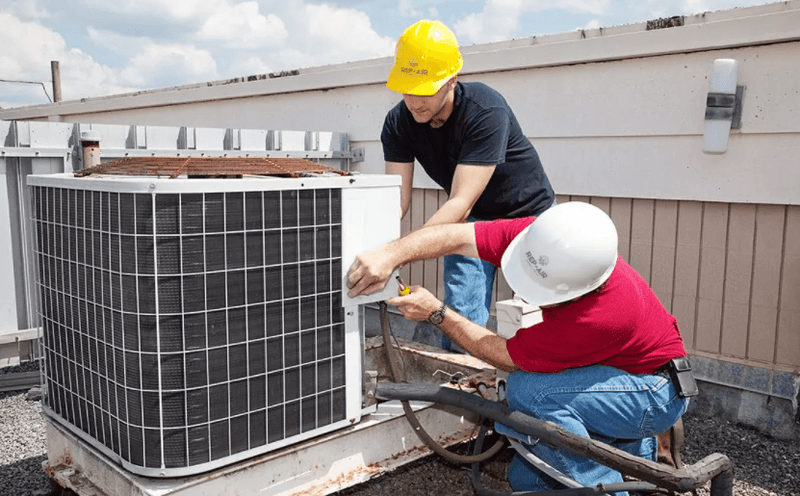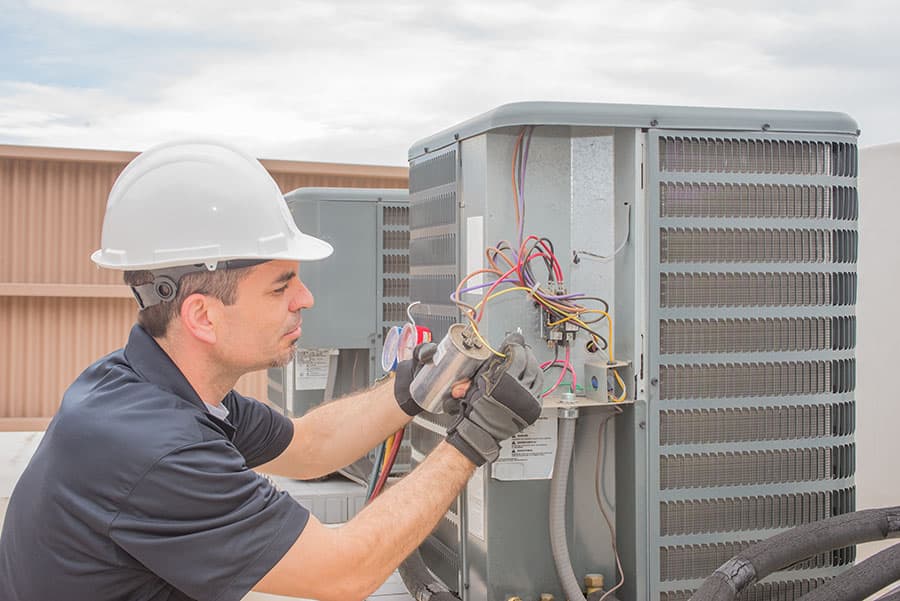Discover how HVAC experts offer preventive care for systems
Wiki Article
Discovering the Crucial Components of an Efficient Heating And Cooling System
An efficient HVAC system is developed on numerous essential elements that operate in consistency. Each component, from the thermostat to the ductwork, plays a crucial duty in preserving comfort and energy effectiveness. Recognizing these aspects is important for maximizing efficiency and improving indoor air top quality. As one checks out these components, the intricate connections between them reveal understandings into boosting general system effectiveness. What specific aspects contribute most to this performance?The Duty of the Thermostat in HVAC Effectiveness

Typically neglected, the thermostat plays a crucial function in the performance of Cooling and heating systems. This small device acts as the primary control facility, controling temperature level settings and making sure excellent comfort within a space. By precisely noticing the ambient temperature level, the thermostat connects with the heating, air flow, and air conditioning units to maintain the desired environment
A reliable thermostat lessens energy intake by turning on the a/c system just when required, therefore avoiding too much heating or cooling. Modern programmable and wise thermostats enhance this performance better by permitting individuals to establish schedules and remotely adjust setups, adjusting to daily routines.
The placement of the thermostat is crucial; improper location can lead to incorrect temperature readings, resulting in inefficient procedure. In general, a well-functioning thermostat not only enhances convenience but additionally contributes substantially to energy financial savings and the longevity of the cooling and heating system.
Understanding the Significance of Air Filters
Air filters offer an important function in cooling and heating systems by ensuring that the air distributing within a space stays clean and healthy. These filters catch dust, irritants, and other pollutants, avoiding them from being recirculated throughout the environment. By capturing these bits, air filters add to boosted indoor air quality, which can significantly benefit occupants' health and wellness, specifically those with allergies or respiratory system problems.Additionally, keeping tidy air filters enhances the efficiency of cooling and heating systems. Clogged up filters can limit air movement, causing the system to work more challenging to keep wanted temperature levels, causing boosted power consumption and higher utility expenses. On a regular basis changing or cleaning filters is a vital maintenance step that can lengthen the life-span of cooling and heating equipment. Ultimately, understanding the significance of air filters enables property owners and building supervisors to take proactive procedures to guarantee a well-functioning, reliable heating and cooling system that promotes a comfy and risk-free interior environment.

The Performance of the Furnace and Heatpump
Heating systems and heatpump are crucial components of HVAC systems, responsible for giving warmth during chillier months. Furnaces operate by heating air through combustion or electric resistance, after that distributing it throughout the home through ducts. They normally use rapid home heating and can be fueled by gas, electrical energy, or oil, depending upon the system type.On the other hand, heatpump transfer warmth as opposed to produce it. They draw out warmth from the outdoors air or ground, also in reduced temperature levels, and transfer it indoors. HVAC experts. This twin performance permits heatpump to additionally provide air conditioning in warmer months, making them functional options for year-round environment control
Both systems need correct maintenance to guarantee performance and long life. While heating systems succeed in severe cold, heatpump can be beneficial in moderate climates. Recognizing their unique performances aids house owners in selecting one of the most appropriate choice for their heating requires.
Discovering the Air Conditioning Unit
The cooling device is a crucial part of heating and cooling systems, readily available in different types to match various requirements. Recognizing the performance rankings of these units is essential for making informed choices about power intake and cost. This area will certainly check out the varied kinds of ac system and make clear exactly how performance rankings influence efficiency.Kinds of Air Conditioners
While different aspects affect the selection of air conditioning navigate to this website systems, comprehending the various types offered is important for homeowners and building managers alike. Central air conditioners are developed to cool down whole homes or buildings, making use of a network of ducts for air flow. Window systems provide a more localized solution, perfect for solitary areas or tiny spaces. Mobile air conditioning system give adaptability, enabling individuals to move the device as required. Ductless mini-split systems are an additional alternative, incorporating the effectiveness of central systems with the ease of zoning, as they call for no ductwork. Lastly, geothermal systems harness the earth's temperature level for energy-efficient cooling. Each type comes with distinctive advantages, making informed selections crucial for effective environment control.
Performance Rankings Explained
Comprehending performance scores is crucial for selecting the appropriate air conditioning system, as these metrics give insight right into the system's performance and energy usage. The most usual score for air conditioners is the Seasonal Energy Performance Proportion (SEER), which measures the cooling outcome throughout a regular cooling period separated by the overall electric power input. A higher SEER shows far better effectiveness. Additionally, the Power Performance Ratio (EER) is made use of for determining effectiveness under certain problems. Another essential metric is the Power Star certification, which indicates that a system meets stringent power effectiveness guidelines. By evaluating these rankings, customers can make informed choices that not only maximize comfort yet also decrease power expenses and environmental influence.The Importance of Ductwork and Air movement
Effective ductwork layout and air flow management play critical functions in the total performance and performance of HVAC systems. Appropriate ductwork warranties that conditioned air is distributed uniformly throughout a space, lessening temperature variations and enhancing comfort. Well-designed air ducts minimize resistance to air flow, minimizing the work on a/c devices and eventually reducing power usage.Airflow monitoring includes strategically placing vents and signs up to boost the circulation of air. This prevents typical problems such as hot or chilly spots, which can happen when air flow is blocked or inadequately balanced. Furthermore, the best air duct materials and insulation can even more enhance effectiveness by decreasing heat loss or gain during air transit.
An effective ductwork system not only contributes to power financial savings yet can additionally lengthen the life-span of a/c tools by decreasing unnecessary strain (HVAC experts). As a result, understanding the significance of ductwork and air flow is crucial for attaining peak HVAC system efficiency
Regular Upkeep Practices to Improve Efficiency
Routine maintenance techniques are important for guaranteeing peak efficiency of cooling and heating systems. These methods include regular evaluations, cleaning, and essential repair services to maintain the system running effectively. Frequently transforming air filters is essential, as clogged filters can obstruct air flow and reduce performance. On top of that, professionals ought to examine and tidy evaporator and condenser coils to avoid getting too hot and power wastefulness.Yearly expert inspections are additionally advised, as qualified service technicians can recognize potential concerns before they intensify. Lubricating relocating parts reduces damage, adding to a longer life expectancy for the system. Making sure that the thermostat functions properly help in keeping suitable temperature control.
Regularly Asked Questions
How Often Should I Change My Thermostat?
Thermostats need to usually be replaced every 5 to one decade, depending on usage and innovation innovations. Routine checks are suggested to guarantee peak performance, particularly if experiencing inconsistent temperature level control or increased energy expenses.What Size Air Filter Is Finest for My HVAC System?
The very best size air filter for a cooling and heating system varies by unit look at here now style. Typically, it's important to speak with the owner's manual or check the existing filter dimensions to assure peak efficiency and air top quality.Can I Set Up a Heatpump Myself?
Mounting a warm pump independently is possible for proficient people, but it needs expertise of local codes and electric systems. see this site Working with a specialist is suggested to guarantee proper installment and suitable system performance.Just how Do I Know if My Ductwork Is Efficient?
To establish ductwork effectiveness, one must check for leakages, step airflow at vents, inspect insulation top quality, and examine temperature level distinctions in between supply and return ducts. Expert assessments can offer extensive insights into total performance.What Are Signs My Cooling And Heating Demands Immediate Maintenance?
Signs that a heating and cooling system needs prompt upkeep include unusual noises, irregular temperatures, enhanced power costs, undesirable smells, and constant biking. Attending to these problems quickly can protect against more damage and guarantee top system performance.Air filters offer an essential feature in Cooling and heating systems by guaranteeing that the air circulating within an area remains healthy and clean. Additionally, maintaining clean air filters enhances the effectiveness of Cooling and heating systems. Ductless mini-split systems are one more choice, integrating the effectiveness of main systems with the benefit of zoning, as they need no ductwork. Comprehending performance rankings is vital for choosing the ideal air conditioning device, as these metrics offer understanding into the system's efficiency and energy consumption. The finest size air filter for a Cooling and heating system differs by unit design.
Report this wiki page